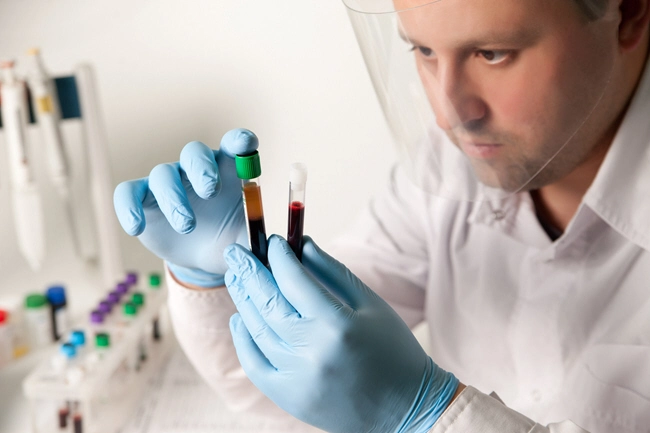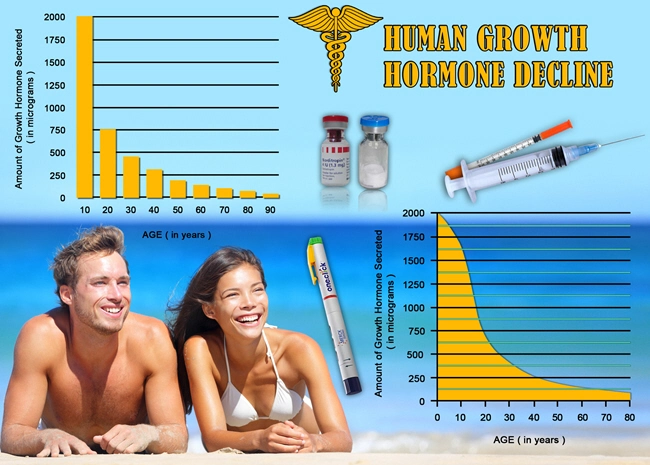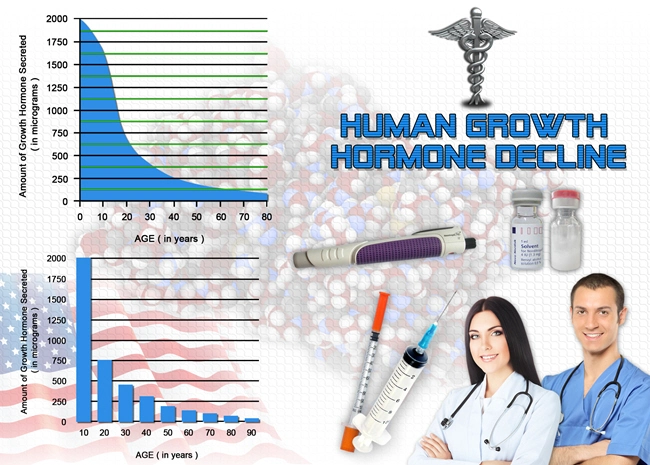
Introduction
In recent years, the field of endocrinology has increasingly focused on the impact of environmental factors on hormonal health. For American men, understanding the role of endocrine-disrupting chemicals (EDCs) is crucial, as these substances can significantly influence hormone levels and overall well-being. This article delves into the effects of EDCs on endocrinology, offering insights into how American men can mitigate these risks and maintain optimal hormonal health.
Understanding Endocrine-Disrupting Chemicals
Endocrine-disrupting chemicals are substances found in the environment that can interfere with the body's hormonal systems. These chemicals are present in various everyday products, including plastics, pesticides, and personal care items. For American men, exposure to EDCs can lead to a range of health issues, from reproductive problems to metabolic disorders. Common EDCs include bisphenol A (BPA), phthalates, and certain pesticides, which can mimic, block, or alter the effects of natural hormones.
Effects of EDCs on Hormonal Health
The impact of EDCs on the endocrine system can be profound. In American men, exposure to these chemicals has been linked to decreased testosterone levels, which can affect fertility, muscle mass, and overall vitality. Studies have shown that EDCs can disrupt the hypothalamic-pituitary-gonadal axis, leading to imbalances in sex hormones. Additionally, EDCs may contribute to the development of conditions such as obesity, diabetes, and thyroid disorders, further complicating hormonal health.
Research Findings on EDCs and American Men
Recent research has shed light on the specific effects of EDCs on American men. A study published in the *Journal of Clinical Endocrinology & Metabolism* found that men with higher levels of BPA in their urine had lower testosterone levels and reduced sperm quality. Another investigation highlighted in *Environmental Health Perspectives* demonstrated a correlation between phthalate exposure and increased risk of insulin resistance, a precursor to type 2 diabetes. These findings underscore the need for American men to be vigilant about their exposure to EDCs.
Strategies for Minimizing EDC Exposure
To protect their hormonal health, American men can take several steps to minimize their exposure to EDCs. One effective strategy is to reduce the use of plastic containers, especially those containing BPA. Opting for glass or stainless steel alternatives can significantly decrease exposure. Additionally, choosing organic produce can help limit contact with pesticide-based EDCs. Men should also be cautious with personal care products, selecting those free of phthalates and other harmful chemicals.
The Role of Diet and Lifestyle in Hormonal Health
Diet and lifestyle play a crucial role in mitigating the effects of EDCs on hormonal health. A balanced diet rich in antioxidants and nutrients can support the body's natural detoxification processes, helping to eliminate harmful chemicals. Regular exercise can also enhance metabolic function and hormone regulation. Furthermore, stress management techniques such as meditation and yoga can help maintain hormonal balance, as chronic stress can exacerbate the impact of EDCs.
Conclusion
The influence of environmental factors on endocrinology is a growing concern for American men. Endocrine-disrupting chemicals pose a significant threat to hormonal health, potentially leading to a range of adverse effects. By understanding the sources of EDCs and taking proactive steps to minimize exposure, American men can safeguard their hormonal well-being. Embracing a healthy diet, regular exercise, and mindful lifestyle choices are essential components of a comprehensive approach to managing the impact of environmental toxins on endocrinology.
Contact Us Today For A Free Consultation
Dear Patient,
Once you have completing the above contact form, for security purposes and confirmation, please confirm your information by calling us.
Please call now: 1-800-380-5339.
Welcoming You To Our Clinic, Professor Tom Henderson.

- Optimizing Testosterone Levels: The Role of Clomiphene Citrate in Treating Secondary Hypogonadism in American Men [Last Updated On: February 21st, 2025] [Originally Added On: February 21st, 2025]
- Multimodal Endocrine Evaluation Crucial for Addressing Fatigue in American Men [Last Updated On: March 4th, 2025] [Originally Added On: March 4th, 2025]
- The Impact of Insulin Resistance on Male Hormonal Health: Strategies for Management [Last Updated On: March 7th, 2025] [Originally Added On: March 7th, 2025]
- The Role of Vitamin D in Male Hormonal Health: Implications for Testosterone Optimization [Last Updated On: March 8th, 2025] [Originally Added On: March 8th, 2025]
- Optimizing Health: Understanding the Cortisol-to-Testosterone Ratio for Personalized Hormone Therapy [Last Updated On: March 9th, 2025] [Originally Added On: March 9th, 2025]
- Unveiling the Potential of Neurosteroid Modulation in Managing Stress-Induced Endocrine Disorders in American Men [Last Updated On: March 12th, 2025] [Originally Added On: March 12th, 2025]
- Exploring hCG Monotherapy and Exogenous Testosterone in Young Men with Hypogonadotropic Hypogonadism: A Focus on Testicular Function [Last Updated On: March 13th, 2025] [Originally Added On: March 13th, 2025]
- Advancements in Male Endocrine Health: The Role of Selective Androgen Receptor Modulators (SARMs) [Last Updated On: March 13th, 2025] [Originally Added On: March 13th, 2025]
- Exploring the Role of Oxytocin in Male Endocrinology: From Physiology to Therapy [Last Updated On: March 15th, 2025] [Originally Added On: March 15th, 2025]
- Precision Medicine in Endocrinology: Tailoring HRT for American Men's Health [Last Updated On: March 16th, 2025] [Originally Added On: March 16th, 2025]
- Thyroid-Testicular Axis: Hormonal Interactions and Male Health Implications [Last Updated On: March 18th, 2025] [Originally Added On: March 18th, 2025]
- Zinc, Selenium, Magnesium: Essential for American Men's Hormonal Health [Last Updated On: March 19th, 2025] [Originally Added On: March 19th, 2025]
- Adipokines' Role in Male Endocrine Health: Insights and Therapeutic Potential for American Men [Last Updated On: March 19th, 2025] [Originally Added On: March 19th, 2025]
- Gut Microbiome's Role in Male Steroid Hormone Metabolism: Emerging Insights [Last Updated On: March 19th, 2025] [Originally Added On: March 19th, 2025]
- Mitochondrial Health and Male Hormones: Therapeutic Strategies for Age-Related Decline [Last Updated On: March 20th, 2025] [Originally Added On: March 20th, 2025]
- Chronobiology's Impact on Male Hormone Testing and Replacement Therapy in American Men [Last Updated On: March 21st, 2025] [Originally Added On: March 21st, 2025]
- Endocrine Disrupting Chemicals: Impact on Male Reproductive Health and Mitigation Strategies [Last Updated On: March 21st, 2025] [Originally Added On: March 21st, 2025]
- Inflammaging and Endocrine Senescence: Impact on Male Hormones and Holistic Management Strategies [Last Updated On: March 21st, 2025] [Originally Added On: March 21st, 2025]
- Pharmacogenomics in HRT: Personalizing Testosterone Therapy for Men with Hypogonadism [Last Updated On: March 22nd, 2025] [Originally Added On: March 22nd, 2025]
- Somatostatin Analogues: Versatile Applications in Male Endocrinology and Health [Last Updated On: March 22nd, 2025] [Originally Added On: March 22nd, 2025]
- Pituitary Incidentalomas in American Men: Evaluation, Management, and Long-Term Care [Last Updated On: March 22nd, 2025] [Originally Added On: March 22nd, 2025]
- Managing Polycythemia in Testosterone Therapy: Monitoring and Evidence-Based Strategies [Last Updated On: March 22nd, 2025] [Originally Added On: March 22nd, 2025]
- Exercise Impact on Male Hormones: Enhancing Health and Therapy [Last Updated On: March 22nd, 2025] [Originally Added On: March 22nd, 2025]
- Optimizing Bone Health: BMD Monitoring Protocols for Men on HRT in the US [Last Updated On: March 23rd, 2025] [Originally Added On: March 23rd, 2025]
- Modulating Ghrelin System Enhances Weight Management in Hypogonadal Men on Testosterone Therapy [Last Updated On: March 23rd, 2025] [Originally Added On: March 23rd, 2025]
- Energy Balance and Reproductive Health in American Men: Neuroendocrine Insights and Clinical Impacts [Last Updated On: March 23rd, 2025] [Originally Added On: March 23rd, 2025]
- Metabolomics Revolutionizes Male Endocrine Health Diagnostics and Management [Last Updated On: March 23rd, 2025] [Originally Added On: March 23rd, 2025]
- Sarcopenia in Aging Males: Hormone Optimization and Lifestyle Integration for Muscle Health [Last Updated On: March 23rd, 2025] [Originally Added On: March 23rd, 2025]
- Advancements in Androgen Receptor Sensitivity Assessment Enhance Personalized HRT for American Men [Last Updated On: March 23rd, 2025] [Originally Added On: March 23rd, 2025]
- SHBG's Impact on Male Health: Hormonal, Metabolic, and Cardiovascular Insights [Last Updated On: March 23rd, 2025] [Originally Added On: March 23rd, 2025]
- Hormone Replacement Therapy: Enhancing Cognitive Function in American Men [Last Updated On: March 23rd, 2025] [Originally Added On: March 23rd, 2025]
- Longitudinal Epigenetic Changes from Hormone Replacement Therapy in American Men [Last Updated On: March 23rd, 2025] [Originally Added On: March 23rd, 2025]
- NAFLD's Bidirectional Impact on Male Endocrine Health: Treatment and Management Strategies [Last Updated On: March 24th, 2025] [Originally Added On: March 24th, 2025]
- Obstructive Sleep Apnea's Endocrine Effects in American Men: Beyond Testosterone [Last Updated On: March 24th, 2025] [Originally Added On: March 24th, 2025]
- Diurnal Hormone Variations in Males: Diagnosis, Treatment, and Future Research [Last Updated On: March 24th, 2025] [Originally Added On: March 24th, 2025]
- Leptin Resistance in Men: Causes, Effects, and Targeted Interventions [Last Updated On: March 24th, 2025] [Originally Added On: March 24th, 2025]
- Luteinizing Hormone: Key Diagnostic and Therapeutic Insights in Male Endocrinology [Last Updated On: March 24th, 2025] [Originally Added On: March 24th, 2025]
- Male Biological Clock: Endocrine Changes and Reproductive Health Impacts with Age [Last Updated On: March 24th, 2025] [Originally Added On: March 24th, 2025]
- Biomarkers in Male Endocrinology: Growth Factors and Cytokines for Diagnosis and Treatment [Last Updated On: March 25th, 2025] [Originally Added On: March 25th, 2025]
- Subclinical Endocrinopathies in American Men: Detection and Management Strategies [Last Updated On: March 25th, 2025] [Originally Added On: March 25th, 2025]
- Male Climacteric Syndrome: Diagnosis, HRT, and Holistic Management for Aging Men [Last Updated On: March 25th, 2025] [Originally Added On: March 25th, 2025]
- Vasopressin's Therapeutic Roles in Male Endocrinology: From Fertility to Cardiovascular Health [Last Updated On: March 25th, 2025] [Originally Added On: March 25th, 2025]
- Testosterone's Role in Managing Autoimmune Diseases in American Men: Clinical Insights [Last Updated On: March 25th, 2025] [Originally Added On: March 25th, 2025]
- Multimarker Approach to Assess Cardiometabolic Risk in American Men on HRT [Last Updated On: March 25th, 2025] [Originally Added On: March 25th, 2025]
- TRT and Prostate Health: Risks, Monitoring, and Management Strategies [Last Updated On: March 25th, 2025] [Originally Added On: March 25th, 2025]
- ECS Influence on Male Reproductive Endocrinology: Insights for American Men's Health [Last Updated On: March 26th, 2025] [Originally Added On: March 26th, 2025]
- Endocrine Frailty in Aging Men: Holistic Management and Preventive Strategies [Last Updated On: March 26th, 2025] [Originally Added On: March 26th, 2025]
- INSL3: A Stable Biomarker for Assessing Leydig Cell Function in Male Health [Last Updated On: March 26th, 2025] [Originally Added On: March 26th, 2025]
- AMH's Expanding Role in Male Endocrinology: Fertility, Disorders, and Beyond [Last Updated On: March 26th, 2025] [Originally Added On: March 26th, 2025]
- Hormone Measurements in Men: Total vs. Free Levels and Clinical Implications [Last Updated On: March 26th, 2025] [Originally Added On: March 26th, 2025]
- Opioid-Induced Endocrinopathy in Men: Mechanisms, Impacts, and Management Strategies [Last Updated On: March 26th, 2025] [Originally Added On: March 26th, 2025]
- Endocrine Reserve Testing: Assessing Hormonal Health in American Men [Last Updated On: March 27th, 2025] [Originally Added On: March 27th, 2025]
- HRT's Impact on Telomere Length: A New Frontier in Male Aging Research [Last Updated On: March 27th, 2025] [Originally Added On: March 27th, 2025]
- Managing HPT Axis Recovery Post-Testosterone in American Males: A Clinical Guide [Last Updated On: March 27th, 2025] [Originally Added On: March 27th, 2025]
- Genetic Insights Revolutionize Male Hypogonadism Diagnosis and Treatment in American Men [Last Updated On: March 27th, 2025] [Originally Added On: March 27th, 2025]
- Endocrine Sequelae of Traumatic Brain Injury in American Men: Management and Follow-Up [Last Updated On: March 27th, 2025] [Originally Added On: March 27th, 2025]
- Post-Traumatic Hypopituitarism in American Men: Diagnosis, Management, and Holistic Care [Last Updated On: March 28th, 2025] [Originally Added On: March 28th, 2025]
- Neuropeptide Y: Key Regulator in Male Endocrine and Metabolic Health [Last Updated On: March 29th, 2025] [Originally Added On: March 29th, 2025]
- Radiation-Induced Hypopituitarism in Men: Hormonal Deficiencies and Replacement Strategies [Last Updated On: March 29th, 2025] [Originally Added On: March 29th, 2025]
- Inhibin B: Key Biomarker for Male Reproductive Health and Fertility Assessment [Last Updated On: March 30th, 2025] [Originally Added On: March 30th, 2025]
- Endocrine Disruption in Men Post-Chemotherapy: Monitoring and Intervention Strategies [Last Updated On: March 31st, 2025] [Originally Added On: March 31st, 2025]
- Managing Endocrine Disruptions in Men with Chronic Kidney Disease: Adaptations and Therapies [Last Updated On: April 2nd, 2025] [Originally Added On: April 2nd, 2025]
- Hemochromatosis in American Men: Endocrine Effects, Screening, and Management Strategies [Last Updated On: April 3rd, 2025] [Originally Added On: April 3rd, 2025]
- Hyperparathyroidism's Impact on Male Reproductive Health: Diagnosis, Treatment, and Management [Last Updated On: April 3rd, 2025] [Originally Added On: April 3rd, 2025]
- Osteoporosis in Men: Causes, Endocrine Evaluation, and Holistic Management Strategies [Last Updated On: April 7th, 2025] [Originally Added On: April 7th, 2025]
- Adrenal Incidentalomas in Men: Evaluation, Management, and Endocrine Focus [Last Updated On: April 8th, 2025] [Originally Added On: April 8th, 2025]
- Cushing's Syndrome in American Men: Symptoms, Diagnosis, and Tailored Management Strategies [Last Updated On: April 9th, 2025] [Originally Added On: April 9th, 2025]
- Hormone Therapy Protocols for Transgender Men: Endocrinology and Monitoring Guidelines [Last Updated On: April 9th, 2025] [Originally Added On: April 9th, 2025]
- Endocrine Management of Male Sexual Desire Disorders in American Men: HRT and PDE5 Inhibitors [Last Updated On: April 9th, 2025] [Originally Added On: April 9th, 2025]
- Growth Hormone and IGF-1: Enhancing Male Athletic Performance and Recovery [Last Updated On: April 9th, 2025] [Originally Added On: April 9th, 2025]
- Hormonal Factors in Male SUI: Insights and Therapeutic Strategies for American Men [Last Updated On: April 10th, 2025] [Originally Added On: April 10th, 2025]
- Exploring Male Hormonal Contraception: Mechanisms, Clinical Trials, and Future Prospects [Last Updated On: April 11th, 2025] [Originally Added On: April 11th, 2025]
- Hormone Replacement Therapy: Preserving Male Fertility Amidst Medical Challenges [Last Updated On: April 11th, 2025] [Originally Added On: April 11th, 2025]
- Enhancing Men's Endocrine Resilience: Biological Mediators and Holistic Strategies [Last Updated On: April 12th, 2025] [Originally Added On: April 12th, 2025]
- AI-Driven Precision Endocrinology: Revolutionizing Male Hormone Therapy [Last Updated On: April 14th, 2025] [Originally Added On: April 14th, 2025]
- Androgen Action: Molecular Insights and Therapeutic Implications for Men's Health [Last Updated On: April 14th, 2025] [Originally Added On: April 14th, 2025]
- CGM: Revolutionizing Endocrinology for Men Beyond Diabetes Management [Last Updated On: April 14th, 2025] [Originally Added On: April 14th, 2025]
- Telehealth Revolutionizes Hormone Replacement Therapy for American Men [Last Updated On: April 15th, 2025] [Originally Added On: April 15th, 2025]
- Cost-Effectiveness of Hormone Replacement Therapy Options for American Men [Last Updated On: April 15th, 2025] [Originally Added On: April 15th, 2025]
- Wearable Tech Advances Hormone Monitoring for American Males in HRT [Last Updated On: April 16th, 2025] [Originally Added On: April 16th, 2025]








